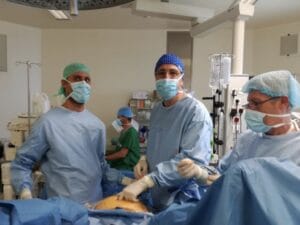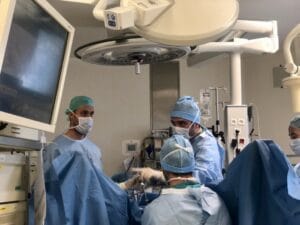Gynaecology and obstetrics is a surgical speciality that, in addition to extensive theoretical knowledge, requires proficiency in a wide range of surgical techniques. Although many of these techniques are described in textbooks and instructional videos, the practical insights and guidance of experienced colleagues play a particularly important role in mastering them. Thanks to my teacher, Dr Juris Vītols, and his more than 25 years of experience in gynaecological endoscopy, I have been able to learn many of these techniques here in Latvia.
Although I gain valuable knowledge through daily work in our clinic, I have long wished to undertake an internship in a foreign clinic. Given the knowledge I had already acquired, not just any clinic was suitable as an internship destination. To learn something new, I had to look for the centre with the most experience. Therefore, I chose as my destination, one of the oldest and most prestigious centres for gynaecological endoscopy in Europe, located in Clermont-Ferrand, France.
My primary aim was to further my knowledge of laparoscopic treatment of endometriosis, particularly deep endometriosis. Secondly, I wanted to improve my skills in treating pelvic organ prolapse. Driven by these goals, I realised that the extensive experience accumulated over many years at the Clermont-Ferrand Centre would be an excellent complement to the knowledge and skills I have already gained from Dr Juris Vītols.
During my internship, I was impressed by the surgeries of Professor Michel Canis. He gladly participated in discussions and generously shared the insights and techniques he has acquired over a lifetime of work in the treatment of endometriosis, a field that is particularly close to my heart. Professor Canis, one of the founders of the World Endometriosis Society, has devoted more than 30 years of his scientific and surgical career to advancing the understanding and surgical treatment of endometriosis. Observing and participating in his surgeries reinforced my confidence that in our clinic, we are on the right track – performing the targeted excision of all endometriosis lesions, a strategy that is both justified and highly desirable for achieving the best treatment outcomes.
I learnt new techniques in laparoscopic pelvic organ prolapse surgery from Professor Revaz Botchorishvili. He is always up-to-date with the latest research and always looks for the most appropriate methods for each patient. Thanks to Professor Botchorishvili, I got answers to questions that I had silently asked myself before. Thanks to his encouragement, we now aim to perform all laparoscopic surgeries at the lowest possible intra-abdominal pressure to minimise postoperative pain and shorten the recovery time.
Alongside the aforementioned specialists, I was able to be present at the operations of Professor Nicola Bourdel, Benoit Rabischong and Jack Pouly. It was also a great pleasure to observe and work with the new and promising generation of gynaecological endoscopy.


After our work in the clinic, my younger colleagues and I attended the Endoscopic Surgery Training Centre, where we refined our laparoscopic suturing skills on a variety of synthetic and animal models, bringing the training process as close to reality as possible. The centre regularly organises lectures and practical training for both French and foreign groups. Interestingly, French gynaecology residents have to go specifically to Clermont-Ferrand at least once during their residency for theoretical and practical training in gynaecological endoscopy. As I had already passed the GESEA (Gynaecological Endoscopic Surgical Education and Assessment) Level 1 and Level 2 exams, I was given the opportunity to stand on the other side of the table and take part in the examination process for residents as well as foreign guests.
Over the course of two months, I gained much valuable experience – both by participating in a variety of gynaecological endoscopic operations and by engaging with new colleagues in discussions on medical topics relevant to our practice. But did I learn anything new and unprecedented that I couldn't get from my mentor in Latvia? At times during the learning process, we may experience doubts and question whether our efforts are truly necessary. Perhaps a modern solution to various gynaecological conditions is some special pill? The greatest benefit of these two months was gaining the conviction that endoscopic surgery plays a crucial role and currently represents the most appropriate diagnostic and therapeutic approach for endometriosis, fibroids, prolapse, certain gynaecological cancers, and other gynaecological conditions. Although I had already acquired most of my knowledge and skills in Latvia, I was able to reinforce them in Clermont-Ferrand and bring back practical insights and techniques to apply in my daily work, further enhancing patient care.
What I have seen in Clermont-Ferrand motivates me to keep going and move towards my goals. Regardless of the knowledge and skills you already have, you should always keep improving. But that’s quality medicine – dynamic, demanding, and always striving for new goals and achievements.
À votre santé!
(“Cheers!” in French)
CALL US:
+371 26 412 412Consultation with an experienced doctor is the first step towards taking care of your health and well-being.
AIZPILDIET PIETEIKUMA FORMU: